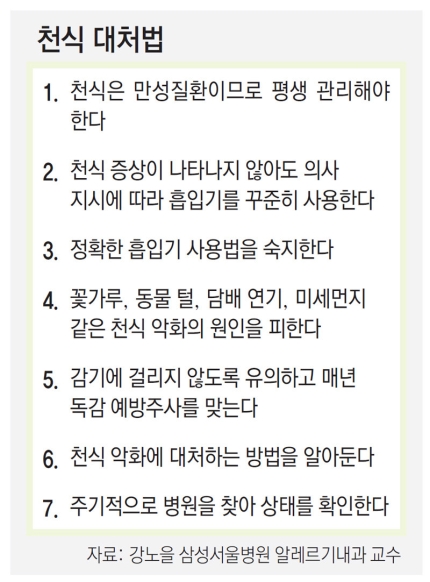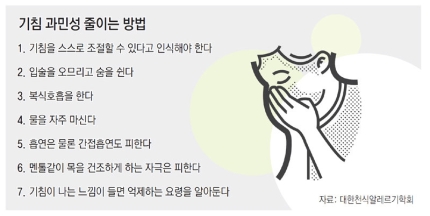기억해두겠습니다 ㅎㅎ 잘관리해야쥬
If a cough lasts a long time, see a doctor if it persists for more than 8 weeks.
Let's learn about chronic cough
Medically, coughing itself is not a disease. It is a natural response of our body to protect the lungs and airways when harmful foreign substances enter from outside. The purpose of coughing is to expel foreign substances. Professor Kang emphasized, "Because of this, there is generally no need to worry if a cough lasts for 1 or 2 weeks." This type of cough is called acute cough, and it is mostly unrelated to any disease.
Coughs that can be classified as illnesses are chronic coughs that last longer than 8 weeks. It refers to coughing that occurs even without external stimuli or foreign substances penetrating, or without any apparent cause for the cough. Currently, it is estimated that in Korea, 3 to 10 out of 100 adults suffer from chronic cough.
There are various factors that cause chronic cough. Some cases of chronic cough are caused by rhinitis (upper airway cough syndrome), while others are due to gastroesophageal reflux disease. Chronic cough can also occur when there are lung diseases or after long-term smoking. Rarely, chronic cough can result from sequelae of respiratory infections experienced during childhood, such as whooping cough. Very rarely, chronic cough can also be caused by side effects of medications.
There are also cases of chronic cough with unknown causes. This is called atypical chronic cough. Most of these patients have a high level of 'cough hypersensitivity.' This means that the nerves related to coughing in the throat and bronchi are excessively sensitive. In such cases, even minor stimuli such as △temperature changes, △posture changes, △food intake, △perfume, △dust, or △speaking can trigger the urge to cough, leading to frequent coughing.
How is it different from asthma?

How can we distinguish whether a cough is caused by asthma or non-specific chronic cough? Accurate diagnosis requires detailed testing at a hospital. However, by carefully observing the pattern of the cough, even laypeople can make some estimations.
If the cough is caused by asthma, there will be a strong sensation of shortness of breath and wheezing. However, the symptom of shortness of breath may not always appear. Therefore, it is important to look for other signs. Note that coughing tends to worsen mainly during seasonal changes or at night.
After catching a cold, asthma-related cough may develop. If a cough persists for more than a month even after recovering from a cold, it should be suspected that asthma has begun. Asthma patients have vulnerable airway mucosa. When cold viruses invade, airway inflammation increases and becomes more sensitive. In this case, using an asthma inhaler promptly can help relieve the pain of coughing.
If gastroesophageal reflux disease is the cause, symptoms of chronic cough and heartburn appear. In more severe cases, there may be a burning sensation in the esophagus. If allergies are the cause, there is a high likelihood of allergic symptoms accompanying nasal congestion.
Non-specific chronic cough manifests in the most diverse ways. First, it has no temporal or seasonal correlation. It can occur throughout the day or not appear for several days. Coughing can happen at any time. Usually, it starts with an itchy throat. It often occurs in paroxysms. Once coughing begins, it tends not to stop easily. Coughing can last for more than an hour. When the cough worsens, it can even cause rib fractures.
In general neighborhood clinics, they may not be able to diagnose asthma precisely. In such cases, inhalers are sometimes prescribed based solely on symptoms. Professor Kang advised, "If there is no effect after using the inhaler for about a week, it is better to go to a higher-level hospital for a detailed examination."
Let's manage a sensitive throat like this
 Original view
Original viewChronic cough should be treated with medication depending on its cause. However, Professor Kang emphasized that correcting lifestyle habits can lead to better results.
First, efforts to reduce cough hypersensitivity should be undertaken simultaneously.
First, it is important to recognize that you can control your coughing. Professor Kang said, "If the cough is not due to phlegm caused by a lung disease, efforts should be made to suppress it." Even if you feel a foreign object in your throat, it is better not to cough involuntarily.
Second, purse your lips and breathe. Doing diaphragmatic breathing along with this is also a way to prevent hypersensitivity. It is also good to frequently drink water in daily life.
Third, you should try to avoid external sensitive stimuli itself. It is best to avoid smoking as well as secondhand smoke. Do not consume substances like menthol that cause a burning sensation in the throat and dryness. However, candies with simple ingredients that have a cough-suppressing effect are okay to eat.
Even if you try hard like this normally, you may experience a sore throat and a cough impulse. At this time, a second effort to avoid coughing is necessary. First, if you feel like coughing, cover your mouth with your arm. Then, swallow saliva or drink water. Hold your breath for 5 to 10 seconds. Next, breathe slowly through your nose for at least 30 seconds. Believe that you will not cough, then release your arm and breathe gently through your nose as usual. If you still feel like you might cough, repeat this process more than twice.